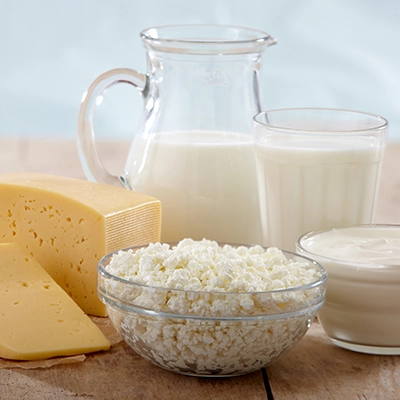Does Cheese Have Protein? 8 High-Protein Cheeses for Your Fitness Journey
Yes, cheese does have protein! In fact, it provides high-quality, complete protein because it's made from milk. which naturally contains both casein and whey. While the exact amount of protein can vary slightly based on the type of cheese, all cheeses contain protein, making them a simple and tasty way to help meet your daily protein needs.
How Much Protein Is In Cheese?
The amount of protein in cheese can vary depending on the type and how it’s made. Hard cheeses like Parmesan and cheddar are typically more concentrated in protein per ounce, and when added to a well-balanced diet, are great for muscle-building and weight management. Softer cheeses like Brie or cream cheese offer a bit less. Here’s a detailed look at the top eight cheeses highest in protein, with their protein content:
Ricotta Cheese
Ricotta Cheese is the highest-protein cheese, offering 14 grams of protein in just half a cup. The part-skim version helps reduce fat while still delivering a strong protein boost. It’s especially useful for muscle recovery and fits well into both sweet and savory dishes, like these Roasted Carrots with Whipped Ricotta and Hot Honey.
Nutritional Content
- Calories: 171
- Protein: 14g
- Fat: 10g
- Carbs: 6g
- Sodium: 155mg
- Calcium: 250mg
Cottage Cheese
Cottage cheese delivers 11 grams of protein per half-cup with very low fat, making it well-suited for helping to achieve weight management goals within a well-balanced diet. Its high satiety factor and low caloric load make it beneficial for those aiming to maintain a caloric deficit. It also works well around workouts, supporting recovery and lean muscle maintenance. Try it in recipes like our Cottage Cheese and Egg Flatbread for a delicious and nutritious meal!
Nutritional Content
- Calories: 98
- Protein: 11g
- Fat: 4.3g
- Carbs: 3.4g
- Sodium: 315mg
- Calcium: 83mg
Parmesan Cheese
Parmesan offers 8 grams of protein per ounce, with a concentrated flavor that enhances meals in small portions. Its low moisture content makes it calorie-dense but easy to portion, which can help those managing intake while maximizing flavor. It's particularly useful for increasing protein without adding bulk to meals like our Air Fried Chicken Parmesan.
Nutritional Content
- Calories: 119
- Protein: 8g
- Fat: 8g
- Carbs: 3.4g
- Sodium: 510mg
- Calcium: 242mg
Swiss Cheese
Swiss cheese offers 8 grams of protein per ounce. It’s a solid choice for those balancing protein intake with lower fat and sodium levels. Its mild flavor and lower sodium make it ideal for simple meals, such as our Potato and Swiss Cheese Gratin, where both taste and nutrition matter, especially for muscle maintenance with minimal calorie surplus.
Nutritional Content
- Calories: 111
- Protein: 8g
- Fat: 8g
- Carbs: 0.4g
- Sodium: 54mg
- Calcium: 200mg
Gouda Cheese
Gouda cheese provides 7 grams of protein per ounce and is known for its creamy texture and mild, buttery flavor. While higher in fat, its satisfying richness can help control hunger and contribute to muscle support within a balanced plan. It’s particularly useful in meals where flavor and texture are key without overrelying on volume like our Smoked Gouda, Ham and Apple Quesadilla.
Nutritional Content
- Calories: 101
- Protein: 7g
- Fat: 8g
- Carbs: 0.6g
- Sodium: 232mg
- Calcium: 198mg
Mozzarella Cheese
Mozzarella cheese is a good source of protein, with part-skim mozzarella providing 7 grams per ounce. Mozarella offers a lighter option that still supports muscle recovery. Its lower fat content and soft texture make it common in lighter, calorie-conscious recipes, like our Caprese Salad Wreath recipe, that still prioritize protein intake.
Nutritional Content
- Calories: 90
- Protein: 7g
- Fat: 7g
- Carbs: 0g
- Sodium: 170mg
- Calcium: 207mg
Cheddar Cheese
Cheddar cheese contains 7 grams of protein per ounce, with a rich flavor that pairs well with many dishes. While slightly higher in calories and fat, its density makes it satisfying in smaller portions, which can help support those building muscle or maintaining weight while enjoying full-flavored meals like our Best Grilled Cheese Sandwhich recipe.
Nutritional Content
- Calories: 115
- Protein: 6.5g
- Fat: 9.4g
- Carbs: 0.9g
- Sodium: 185mg
- Calcium: 200mg
Blue Cheese
Blue cheese delivers 6 grams of protein per ounce and stands out for its bold, tangy flavor. Its intensity means smaller portions go a long way, making it easier to manage calorie intake while still boosting protein. This makes it a smart choice for flavor-packed meals, like our Dirty Martini Pasta with Blue Cheese.
Nutritional Content
- Calories: 100
- Protein: 6g
- Fat: 8.2g
- Carbs: 0.7g
- Sodium: 325mg
- Calcium: 150mg
Can Cheese Replace Meat As Protein?
Yes, cheese can replace meat as a protein source. It offers complete protein—containing all nine essential amino acids—just like meat. However, cheese is generally more calorie- and fat-dense per gram of protein than most lean meats. For those focused on building muscle or maintaining a high-protein diet, cheese can be an effective part of the protein mix, especially when paired with other sources like legumes, eggs, or Greek yogurt to balance calorie intake.
What Has More Protein: Cheese or Eggs?
It depends on the type of cheese. Some cheeses, like part-skim ricotta (14g per ½ cup) or Parmesan (8g per ounce), contain more protein than a single large egg (6g). However, eggs provide high-quality protein with fewer calories and less fat per gram of protein. So while certain cheeses offer more total protein, eggs are often more efficient for protein intake if you're watching calories.















